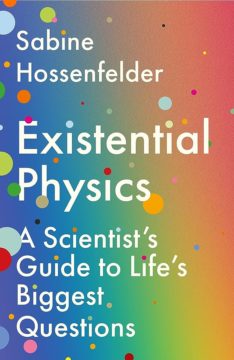https://www.youtube.com/watch?v=6GXIWI1hj9w&ab_channel=PhilosophyOverdose
Category: Archives
COVID-19 And The New Science Wars
Jason Blakely at Harper’s Magazine:
 Invoking science and data to resolve ethical and ideological controversies obscures the values and interests of particular groups and policymakers. Anyone governing in the name of data is still making judgments. When the Italian philosopher Giorgio Agamben suggested that emergency dictates reflected that the governing ethic in Western societies had become “bare life, and the fear of losing it,” thereby reflecting a politics that “values nothing more than survival,” he was criticized for recklessness. Yet he rightly intuited that much of the expert response to the pandemic was shaped by an unstated vision of what human life was ultimately about. The assertion made by officials that the pandemic simply dictated certain policy responses was a way of suppressing underlying ethical and political disagreements.
Invoking science and data to resolve ethical and ideological controversies obscures the values and interests of particular groups and policymakers. Anyone governing in the name of data is still making judgments. When the Italian philosopher Giorgio Agamben suggested that emergency dictates reflected that the governing ethic in Western societies had become “bare life, and the fear of losing it,” thereby reflecting a politics that “values nothing more than survival,” he was criticized for recklessness. Yet he rightly intuited that much of the expert response to the pandemic was shaped by an unstated vision of what human life was ultimately about. The assertion made by officials that the pandemic simply dictated certain policy responses was a way of suppressing underlying ethical and political disagreements.
In this way, “the pandemic” served a governing function not unlike “the economy.” There was a bid—albeit never fully successful—at creating a social object to scientifically overcome ideological conflict in American politics.
more here.
Hatchet-Throwing in Forgotten Places
Hannah Kennedy at Belt Magazine:
 I get sentimental about places, especially forgotten ones like Monarch Park. They’re a bit of a bummer, a bit sobering, a bit sad. But I think it’s a good kind of sadness. It’s the kind of sadness that reminds us that life is short: our joy and sorrow are fleeting, the places and people we love are temporary and the extent to which the world will remember us is limited. We don’t like to think about this as human beings. We like to think we’re the main characters of the world’s story, the center of it all, like a 120-foot Electric Tower of light rising high above a magnificent amusement park.
I get sentimental about places, especially forgotten ones like Monarch Park. They’re a bit of a bummer, a bit sobering, a bit sad. But I think it’s a good kind of sadness. It’s the kind of sadness that reminds us that life is short: our joy and sorrow are fleeting, the places and people we love are temporary and the extent to which the world will remember us is limited. We don’t like to think about this as human beings. We like to think we’re the main characters of the world’s story, the center of it all, like a 120-foot Electric Tower of light rising high above a magnificent amusement park.
In reality, we are not permanent fixtures in the world. Instead, we are… people. Spending a little time here before moving on, experiencing great joy and pain and doing our best to create beautiful moments wherever we can. Like the many forgotten people in these pictures, our story is short, but the joy and beauty left in our wake are not insignificant. When I look at the faces in these pictures, I see a moment of life, which is in itself a thing of value.
more here.
Why Read John Milton?
Ed Simon in The Millions:
 As a sophomore in college, I completely earned the C+ that I received in a survey course called “British Literature.” There could be no blaming of the professor on my end, no skirting responsibility for those missed assignments, no excuse for having confused Belphoebe for Gloriana in Edmund Spenser’s The Faerie Queene on multiple choice tests. In the spring semester of 2004, I was more concerned with Yuengling than I was with Geoffrey Chaucer or the Pearl Poet, so I fully deserved the middling grade that I got.
As a sophomore in college, I completely earned the C+ that I received in a survey course called “British Literature.” There could be no blaming of the professor on my end, no skirting responsibility for those missed assignments, no excuse for having confused Belphoebe for Gloriana in Edmund Spenser’s The Faerie Queene on multiple choice tests. In the spring semester of 2004, I was more concerned with Yuengling than I was with Geoffrey Chaucer or the Pearl Poet, so I fully deserved the middling grade that I got.
Yet that class was also the site of an important discovery: the stern, austere, blind Puritan bard John Milton. For the past two decades, I’ve read and reread Milton, written about Milton, taught Milton, thought about Milton. I don’t know if I’m any closer to really understanding his greatest work, for that magisterial 1667 poem Paradise Lost is a cosmos unto itself, like Dante’s The Divine Comedy or Melville’s Moby-Dick, but I know that my life wouldn’t be as rich without it.
More here.
Why Insect Memories May Not Survive Metamorphosis
Yasemin Saplakoglu in Quanta:
 On warm summer nights, green lacewings flutter around bright lanterns in backyards and at campsites. The insects, with their veil-like wings, are easily distracted from their natural preoccupation with sipping on flower nectar, avoiding predatory bats and reproducing. Small clutches of the eggs they lay hang from long stalks on the underside of leaves and sway like fairy lights in the wind.
On warm summer nights, green lacewings flutter around bright lanterns in backyards and at campsites. The insects, with their veil-like wings, are easily distracted from their natural preoccupation with sipping on flower nectar, avoiding predatory bats and reproducing. Small clutches of the eggs they lay hang from long stalks on the underside of leaves and sway like fairy lights in the wind.
The dangling ensembles of eggs are beautiful but also practical: They keep the hatching larvae from immediately eating their unhatched siblings. With sickle-like jaws that pierce their prey and suck them dry, lacewing larvae are “vicious,” said James Truman, a professor emeritus of development, cell and molecular biology at the University of Washington. “It’s like ‘Beauty and the Beast’ in one animal.”
This Jekyll-and-Hyde dichotomy is made possible by metamorphosis, the phenomenon best known for transforming caterpillars into butterflies. In its most extreme version, complete metamorphosis, the juvenile and adult forms look and act like totally different species.
More here.
Yann LeCun: on AI systems that can learn, remember, plan, reason, have common sense, yet are steerable and safe
All of the talks from the MIT event “The Impact of ChatGPT” are here.
What’s won and lost — but mostly lost — in globalization
Alejandro Varela in Guernica:
 I’m an adult, but my grandmother makes my shirts. The ones with good wicking properties that I wear on my morning runs. Five days per week she sits behind an industrial sewing machine in a room full of them, all cream-colored with metallic details. The machines, that is. The people, mostly women, have shades of brown, resilient skin that has outlived civil war. They rarely giggle. At times, they laugh, eat, go to the bathroom, flirt with ideas, fan themselves with their hands. But for most of the day, they are taciturn, patiently outlasting the drudgery, anticipating evening mass or a phone call from my mother. They aren’t all awaiting my mother’s call. They each have their own daughters. Their sons, however, are dead — a few daughters, too. Not all of them, but enough to dress in black for years. Some of the calls travel long distances. International calls from the United States, mostly. The lucky ones are in Canada — because of the egalitarian policies. The ones who are luckier still are in Vancouver. They ski. Not the daughters, but their children. Skiing is lovely if you can tolerate the ceremony of it all, and the other skiers. My grandmother, however, doesn’t care much for winter sports, even when she’s sewing useful, sometimes clandestine pockets into climate-resistant attire. She cares only about my mother, neat stitches, and, indirectly, about Jesus. She also thinks Richard Dean Anderson, the actor who played MacGyver in the eponymous 1980s television show that was a primetime darling in El Salvador, is a babe. I agreed, but I never said as much. I was eight and visiting my mother’s motherland for only the second time; an admission of that kind would have been about as well received as an incurable retrovirus.
I’m an adult, but my grandmother makes my shirts. The ones with good wicking properties that I wear on my morning runs. Five days per week she sits behind an industrial sewing machine in a room full of them, all cream-colored with metallic details. The machines, that is. The people, mostly women, have shades of brown, resilient skin that has outlived civil war. They rarely giggle. At times, they laugh, eat, go to the bathroom, flirt with ideas, fan themselves with their hands. But for most of the day, they are taciturn, patiently outlasting the drudgery, anticipating evening mass or a phone call from my mother. They aren’t all awaiting my mother’s call. They each have their own daughters. Their sons, however, are dead — a few daughters, too. Not all of them, but enough to dress in black for years. Some of the calls travel long distances. International calls from the United States, mostly. The lucky ones are in Canada — because of the egalitarian policies. The ones who are luckier still are in Vancouver. They ski. Not the daughters, but their children. Skiing is lovely if you can tolerate the ceremony of it all, and the other skiers. My grandmother, however, doesn’t care much for winter sports, even when she’s sewing useful, sometimes clandestine pockets into climate-resistant attire. She cares only about my mother, neat stitches, and, indirectly, about Jesus. She also thinks Richard Dean Anderson, the actor who played MacGyver in the eponymous 1980s television show that was a primetime darling in El Salvador, is a babe. I agreed, but I never said as much. I was eight and visiting my mother’s motherland for only the second time; an admission of that kind would have been about as well received as an incurable retrovirus.
More here.
Tuesday, August 8, 2023
Bias doesn’t always undermine truth
Katherine Puddifoot at IAI News:
 Suppose you are considering your career choices. You decide you are going to be a world-leading research scientist. You believe that you are as likely to succeed as anyone else. You are also a young woman. Women are statistically underrepresented in higher level science, and you are aware of countless articles describing structural barriers faced by women in the sciences making it harder for them to reach the higher echelons of the profession. There isn’t anything about your skills or upbringing that gives you reason to think that you are less likely to face these barriers than other women. Nonetheless, because you want to believe that you are as likely to succeed as your male counterparts, you focus your attention on the successes of specific high profile woman scientists, and these successes allow you to believe what you want to.
Suppose you are considering your career choices. You decide you are going to be a world-leading research scientist. You believe that you are as likely to succeed as anyone else. You are also a young woman. Women are statistically underrepresented in higher level science, and you are aware of countless articles describing structural barriers faced by women in the sciences making it harder for them to reach the higher echelons of the profession. There isn’t anything about your skills or upbringing that gives you reason to think that you are less likely to face these barriers than other women. Nonetheless, because you want to believe that you are as likely to succeed as your male counterparts, you focus your attention on the successes of specific high profile woman scientists, and these successes allow you to believe what you want to.
Here you engage in what psychologists call motivated reasoning: believing what you do because you want to. You also believe this despite strong evidence to the contrary.
It would be easy to assume that this type of reasoning always leads people astray.
More here.
Review of Sabine Hossenfelder’s “Existential Physics”
Jenann Ismael at her own website:
 There is a tradition of physicists writing popular books that reflect philosophically on what physics can teach us about the human condition. This book is a contribution to the genre. Hossenfelder is a physicist who works on quantum gravity, with a blog that made her known as a gadfly in her field. A previous book took on one of the sacred cows of theoretical physics – the pursuit of beauty in theorizing – and in this book she says that she is going to bring established science to bear on the kinds of questions that ordinary people ask: “people don’t care much whether quantum mechanics is predictable, they want to know whether their own behavior is predictable; … They don’t care much
There is a tradition of physicists writing popular books that reflect philosophically on what physics can teach us about the human condition. This book is a contribution to the genre. Hossenfelder is a physicist who works on quantum gravity, with a blog that made her known as a gadfly in her field. A previous book took on one of the sacred cows of theoretical physics – the pursuit of beauty in theorizing – and in this book she says that she is going to bring established science to bear on the kinds of questions that ordinary people ask: “people don’t care much whether quantum mechanics is predictable, they want to know whether their own behavior is predictable; … They don’t care much
whether galactic filaments resemble neuronal networks; they want to know whether the universe can think”. More ambitiously, she is going to convey what physics tell us about the human condition. What are we? (Are you just a bag of atoms?) Has physics ruled out free will? The book, she says “is for those who have not forgotten to ask the big questions.” She isn’t going to talk about the speculative parts of science, for the most part. She says that she is just going to report what established science says about the kinds of questions that appeal to non-professional curiosity. Brilliant!
More here.
James Maynard on Winning the Fields Medal
Book Review: The Rise and Fall of the Third Reich
From Astral Codex Ten:
 Hitler’s skyrocketing rise to power is great data for building our threat models. But Mike Godwin is right: it’s easy to see Hitler everywhere. And if we say “Watch out: this is exactly how Hitler came to power!” once a week, eventually no one will even bother turning their head to look.
Hitler’s skyrocketing rise to power is great data for building our threat models. But Mike Godwin is right: it’s easy to see Hitler everywhere. And if we say “Watch out: this is exactly how Hitler came to power!” once a week, eventually no one will even bother turning their head to look.
My hope is that this review of The Rise and Fall of the Third Reich can help us identify what it looks like when Hitler is actually about to come to power, so that we can save that most urgent alarm bell—the one marked with the swastika and the Charlie Chaplin mustache—for this one situation only and avoid a boy-who-cried-wolf-scenario. Consider this an exercise in fine-tuning our threat models so that we can tell the difference between bad and this-is-stage-one-in-Hilter’s-rise-to-power bad.
Let’s get started.
More here.
We Are All Animals At Night
Lana Hall at Hazlitt:
 I’ll tell you a secret about working in a massage parlour: it’s a lot of waiting around, usually late at night. We’d wait, half a dozen of us, in the dressing room as the evening wore on. On edge and exhausted in equal parts, we perched on the low-slung couch, adjusted the straps of our babydolls, listlessly fluffed our hair, ready to spring into action.
I’ll tell you a secret about working in a massage parlour: it’s a lot of waiting around, usually late at night. We’d wait, half a dozen of us, in the dressing room as the evening wore on. On edge and exhausted in equal parts, we perched on the low-slung couch, adjusted the straps of our babydolls, listlessly fluffed our hair, ready to spring into action.
Girl, I’m going insane.
Oh please, I’m already there.
Then, we’d hear the front door open, the low murmur of a man’s voice, the chirp of the receptionist from the parlour’s reception desk. Some of us would circle the dressing room door, ready in case he wanted to see the lineup, curious if he had booked someone specific. Then, the methodical thwack of the receptionist’s pumps would sound down the long hallway as the girls swivelled towards her from their respective stations—pulling towels from the dryer, applying lipstick at the vanity, melting into the couch in a cloud of cigarettes and Pink Sugar perfume.
more here.
Tuesday Poem
Cradle Song
—for Luciana, one month old
One squall from your tiny body, fevered
in the night, outweighs an electorate,
undoes the disgust that knots up my throat
with talk of power and its Founding Fathers.
You’re not the first to come into the world
where bad men bleed the meek, lie about it,
and smile. Burrow deeper into my shirt,
arching bluebell of my most hopeful hour.
For far too few years I know you’ll be safe
in our home, but after that your nation
will try to teach you its collateral
vocabularies of shackle and pledge.
Don’t learn them. Your birthright is no baton.
Don’t wield it. Beacon it, this broken hymn,
this lullaby your father sings to you,
made of spindrift love and rage and larkspur.
by Dante Di Stefano
from What Saves Us —Poems of Empathy
and Outrage in the age of Trump
Edited by Martín Espada
Jonathan Rée: Ludwig Wittgenstein’s Tractatus
The Death Of Pee Wee
Charlie Fox and others at Artforum:
 PAUL REUBENS, who died on July 30, aged seventy, was not just an American original, entertainer, actor, mischief-maker, and mensch, but a great artist. His most famous creation was, of course, Pee-wee Herman, the adorably bonkers, puppy-dog-eyed anarchist in red bowtie and gray plaid suit who took TV off into a wild and wonderful dreamscape totally beyond anywhere (or anything!) it had been before. A CalArts alumnus (student of Allan Kaprow; classmate of David Hasselhoff), Reubens said, “I always felt [Pee-wee] was conceptual art but no one knew that except me.” Yup, he got right into the Reagan-era mainstream when things were hideous to the max and created all kinds of hallucinogenic chaos. Behold his masterpiece, Pee-wee’s Playhouse (1986–91): At the height of the AIDS crisis, queer royalty came over every Saturday morning: Little Richard! Sandra Bernhard! Grace Jones! His adventures, lair, and pals were wholly innocent and extremely subversive, an outrageous celebration of imagination and otherness run amok at a time when that was severely endangered. No other show (nominally “for kids”) has ever been louder or more delighted about being Art, a simultaneously freaky and extremely heartwarming carnival high on its own psychedelic rollercoaster aesthetics, full of nonstop chaos. It was a neon gift and a gateway drug for tons of kids who grew up to be artists. Gathered below, a mourning chorus of friends, collaborators, and devotees give just a hint of the magical singularity of his talents and influence—and of how deeply he’ll be missed.
PAUL REUBENS, who died on July 30, aged seventy, was not just an American original, entertainer, actor, mischief-maker, and mensch, but a great artist. His most famous creation was, of course, Pee-wee Herman, the adorably bonkers, puppy-dog-eyed anarchist in red bowtie and gray plaid suit who took TV off into a wild and wonderful dreamscape totally beyond anywhere (or anything!) it had been before. A CalArts alumnus (student of Allan Kaprow; classmate of David Hasselhoff), Reubens said, “I always felt [Pee-wee] was conceptual art but no one knew that except me.” Yup, he got right into the Reagan-era mainstream when things were hideous to the max and created all kinds of hallucinogenic chaos. Behold his masterpiece, Pee-wee’s Playhouse (1986–91): At the height of the AIDS crisis, queer royalty came over every Saturday morning: Little Richard! Sandra Bernhard! Grace Jones! His adventures, lair, and pals were wholly innocent and extremely subversive, an outrageous celebration of imagination and otherness run amok at a time when that was severely endangered. No other show (nominally “for kids”) has ever been louder or more delighted about being Art, a simultaneously freaky and extremely heartwarming carnival high on its own psychedelic rollercoaster aesthetics, full of nonstop chaos. It was a neon gift and a gateway drug for tons of kids who grew up to be artists. Gathered below, a mourning chorus of friends, collaborators, and devotees give just a hint of the magical singularity of his talents and influence—and of how deeply he’ll be missed.
more here.
How Manipur violence is challenging India’s politics
Ellen Ioanes in Vox:
 Interethnic violence has grown over the summer in India’s northeastern Manipur state, with reports on Thursday claiming three people had been killed and several homes set on fire. The clashes, between the majority Meitei ethnic group and the Kuki tribal groups, risk spilling into neighboring states, but Prime Minister Narendra Modi’s government has thus far failed to seriously address the violence or the broader underlying issues of migration and ethnic tensions in the region.
Interethnic violence has grown over the summer in India’s northeastern Manipur state, with reports on Thursday claiming three people had been killed and several homes set on fire. The clashes, between the majority Meitei ethnic group and the Kuki tribal groups, risk spilling into neighboring states, but Prime Minister Narendra Modi’s government has thus far failed to seriously address the violence or the broader underlying issues of migration and ethnic tensions in the region.
Since May 3, Meitei and Kuki residents of communities in Manipur have engaged in horrific violence including reported rapes, burnings, and decapitations, apparently motivated by the state government’s efforts to extend benefits and jobs once exclusively reserved for Kukis to Meiteis. Over the past three months, the violence has become so extreme that it has triggered a no-confidence motion against Modi’s government this coming week. Though the proposed motion won’t affect Modi and his Bharatiya Janata Party’s (BJP) grip on power, it will serve two main political purposes: to draw attention to the government’s inaction in containing the conflict as well as other failures and to galvanize the opposition under a new umbrella group. Interethnic, sectarian, and insurgent violence is not new to India, and Modi’s Hindu nationalist ideology has contributed to the atmosphere of discord, if not outright fueled violence in some cases. The BJP governs Manipur state, and rather than attempting mediation between the largely Hindu Meiteis and Christian Kukis, the state government imposed an internet blackout that was only partially lifted last month.
More here.
How to Find Joy in Your Sisyphean Existence
Arthur C. Brooks in The Atlantic:
 Sisyphus, the king of Ephyra, was renowned in Greek mythology for his ingenuity; indeed, so clever was he that he cheated death twice, angering the gods. They took their revenge by condemning Sisyphus to eternal torment in the underworld: He had to roll a huge boulder up a hill. When he reached the top, the stone would roll back down to the bottom, and he would have to start all over, on and on, forever.
Sisyphus, the king of Ephyra, was renowned in Greek mythology for his ingenuity; indeed, so clever was he that he cheated death twice, angering the gods. They took their revenge by condemning Sisyphus to eternal torment in the underworld: He had to roll a huge boulder up a hill. When he reached the top, the stone would roll back down to the bottom, and he would have to start all over, on and on, forever.
Nowadays, any task combining boredom, struggle, stress, and futility might be labeled “Sisyphean.” Think of so-called duct-tapers in customer service, who are tasked to deal with angry people all day, while the conditions that create those aggressive customers never change. I’ve used the word to describe my former job as a French-horn player in a professional symphony orchestra (which was approximately 99 percent boredom, 1 percent terror). One could even argue that all of life is Sisyphean: We eat to just get hungry again, and shower just to get dirty again, day after day, until the end.
Absurd, isn’t it? Albert Camus, the philosopher and father of a whole school of thought called absurdism, thought so. In his 1942 book The Myth of Sisyphus, Camus singles out Sisyphus as an icon of the absurd, noting that “his scorn of the gods, his hatred of death, and his passion for life won him that unspeakable penalty in which the whole being is exerted toward accomplishing nothing.” If that doesn’t make you want to reach for a filterless cigarette, I don’t know what will.
More here.
Sunday, August 6, 2023
Peter Heller: My Mother the Gumshoe
Peter Heller in Crime Reads:
 My mother was a private eye. She was petite and elegant, she could shoot and drive, and she was a crack investigator.
My mother was a private eye. She was petite and elegant, she could shoot and drive, and she was a crack investigator.
She was born in Paris in 1933 to an American banker and a Connecticut socialite and lived there until the Germans drove them out. She arrived in Manhattan speaking only French, and all she wanted to do was return to France and fight in the French Resistance. She was seven. Everywhere she went in New York City she would listen to groups of people talking and try to make out from their tone and gestures who was a Nazi spy. She had the investigative bent early on.
Once she had kids she got her P.I. license. About a week later the FBI called. They wondered if she could help them track down the perpetrator of a large fraud on the Bank of New York.
More here.
Who Controls AI?
From Project Syndicate:
 The challenge of regulating generative artificial intelligence has been a topic of fierce debate since the technology captured the world’s attention late last year. But when it comes to ensuring that generative AI advances the common good, the who is just as important as the how.
The challenge of regulating generative artificial intelligence has been a topic of fierce debate since the technology captured the world’s attention late last year. But when it comes to ensuring that generative AI advances the common good, the who is just as important as the how.
For MIT’s Daron Acemoglu, Simon Johnson, and Austin Lentsch, workers themselves must play a central role in compelling their employers not to pursue mindless automation, but rather to use AI to augment human creativity, boost productivity, and ultimately drive widely shared prosperity. The ongoing Writers Guild of America strike will be an important litmus test: if striking Hollywood screenwriters fail, “other knowledge workers will stand even less of a chance of shaping the future of work and technology.”
Maria Eitel, Nike’s founding Vice President of Corporate Responsibility, places the onus for limiting the dangers of AI squarely on the companies developing and applying the technology.
More here.
‘If I left, I’d have to go without a word’: how I escaped China’s mass arrests
Tahir Hamut Izgil in The Guardian:
 One day in mid-March 2017, I had just finished giving my weekly lecture on film directing at Xinjiang Arts Institute in Urumqi when my wife called. She told me that our friend Dilber had arrived from Kashgar, in south-west Xinjiang, and that she was headed to the front gate of the Arts Institute to meet her. Dilber was the hospitality director of a famous Kashgar hotel. While shooting the television series Kashgar Story the year before, our film crew had stayed at the hotel for two months. We chatted often with Dilber and had a number of meals together; by the time we left Kashgar, we had got to know each other well.
One day in mid-March 2017, I had just finished giving my weekly lecture on film directing at Xinjiang Arts Institute in Urumqi when my wife called. She told me that our friend Dilber had arrived from Kashgar, in south-west Xinjiang, and that she was headed to the front gate of the Arts Institute to meet her. Dilber was the hospitality director of a famous Kashgar hotel. While shooting the television series Kashgar Story the year before, our film crew had stayed at the hotel for two months. We chatted often with Dilber and had a number of meals together; by the time we left Kashgar, we had got to know each other well.
Over the phone, my wife, Marhaba, told me that Dilber’s son, who was studying acting at Xinjiang Arts Institute, had been drinking and picking fights in his dorm, and that the institute was threatening to expel him for violating the code of conduct. Dilber had hurried to Urumqi to plead with school administrators for her son to be allowed to continue his studies.
More here.
